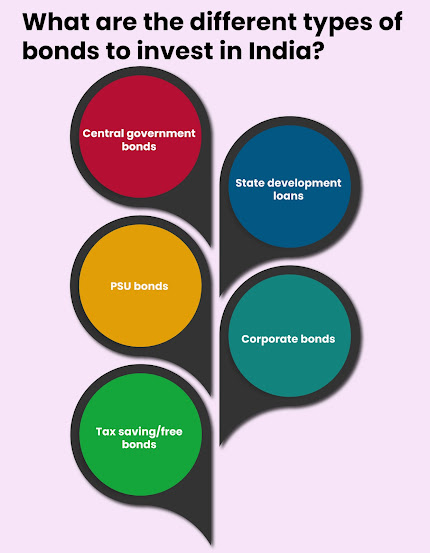Top Government Bonds to Consider for Investment in India
Are you looking for a safe and lucrative investment option in India? Look no further! In this blog post, we will introduce you to the top government bonds that are worth considering for your investment portfolio. Whether you're a seasoned investor or just starting out, these bonds offer stability, security, and attractive returns. So buckle up and get ready to discover the best government bonds to help grow your wealth while providing peace of mind.
Introduction to Government Bonds in India
Government bonds in India are debt securities issued by the central government of India. They are also known as G-Secs. The Reserve Bank of India (RBI) is India's primary issuer of government bonds. Government bonds are considered to be one of the safest investments and offer predictable and stable returns.
The interest rate on government bonds is fixed for the entire tenure of the bond. The bondholder receives periodic interest payments, known as coupons, at regular intervals. At maturity, the bondholder receives the principal amount invested initially. Government bonds have a typical tenure of 5-10 years.
Government bonds are an attractive investment option for investors looking for safe and stable returns. The interest rate on government bonds is often higher than that offered by bank deposits. Moreover, government bonds are exempt from income tax and capital gains tax.
Investors can purchase government bonds directly from RBI through its website or through designated banks and stockbrokers. Government bonds can also be purchased from the secondary market, where they are traded on stock exchanges.
Types of Government Bonds in India
There are four types of government bonds in India: treasury bills, dated securities, state development loans, and market stabilisation scheme bonds.
Treasury bills are short-term debt instruments issued by the central government for maturities of 91 days, 182 days, and 364 days.
Dated securities are medium- to long-term debt instruments with maturities ranging from 2 to 30 years.
State development loans are bonds issued by state governments for infrastructure development projects.
Market stabilisation scheme bonds are short-term debt instruments the Reserve Bank of India issued to manage market liquidity.
Advantages of Investing in Govt. Bonds
The Government of India issues bonds to raise money for various development and infrastructure projects. These bonds are considered one of India's safest investments since they are backed by the full faith and credit of the government.
Government bonds offer a number of advantages for investors, including:
-Safety: Government bonds are generally considered to be much safer than other types of investments, such as stocks or real estate. This is because the government has the ability to tax its citizens to make bond payments if needed.
-Stability: Government bonds are much more stable than other investments, providing a relatively predictable return. This makes them an ideal investment for those who are risk-averse or looking for a long-term investment.
-Diversification: Bonds can help diversify an investment portfolio, reducing overall risk.
-Tax benefits: Interest earned on government bonds is often exempt from taxes, making them even more attractive for investors.
List of Government Bonds Available for Investment in India
Government bonds are debt securities issued by the government of India and guaranteed by the central government. The Government of India offers a wide variety of investment bonds, including short-term and long-term ones.
Short-term government bonds, also known as Treasury bills, have one year or less maturities. These bonds are typically issued at a discount to face value, meaning that investors will receive less than the total face value of the bond when it matures. For example, if a Rs.100 T-bill is issued at a discount of 10%, the investor will receive Rs.90 when the bond matures.
Long-term government bonds have maturities of more than one year. These bonds typically pay interest semi-annually and are issued at par, meaning that investors will receive the total face value of the bond when it matures. For example, if a Rs.100 bond is printed with a coupon rate of 7%, the investor will receive Rs.7 in interest every six months and will receive Rs.100 when the bond matures.
The table below lists some of the government bonds available for investment in India:
Treasury Bills:
-91 days
-182 days
-364 days
Government Bonds:
-2 years
-3 years
-5 years
-7 years
-10 years
-15 years
-20 years
How to Invest in Government Bonds?
Government bonds are one of the most popular investment options in India. Though government bonds have traditionally been considered safe investments, they offer good returns and are easily accessible to investors.
Government bonds can be bought from banks, financial institutions, and stock exchanges. They can also be purchased directly from the government through its website. Government bonds are available in different denominations and maturity periods. Investors can choose the bond that best suits their needs and risk appetite.
Government bonds are a good investment option for those looking for safety and stability. They offer good returns and are easily accessible to investors.
What are the Risk Factors?
There are a few risk factors to consider before investing in government bonds. These include:
-The issuer's credit risk is the risk that the issuer will not be able to make interest or principal payments on the bond.
-Market risk: This is the risk that changes in market conditions will affect the bond price.
-Inflation risk: This is the risk that inflation will reduce the purchasing power of the interest payments and/or principal repayment.
-Interest rate risk: This is the risk that interest rate changes will affect the bond price.
Conclusion
Investing in government bonds is a great way to diversify your portfolio and ride out market volatility. With the proper research, you can find some of the best government bonds available in India that offer attractive returns. Government bonds are considered relatively safe investments since they are backed by the full faith and credit of the government. Additionally, these types of investments come with tax advantages, making them an attractive option for investors looking for stable income streams and capital appreciation opportunities.




Comments
Post a Comment